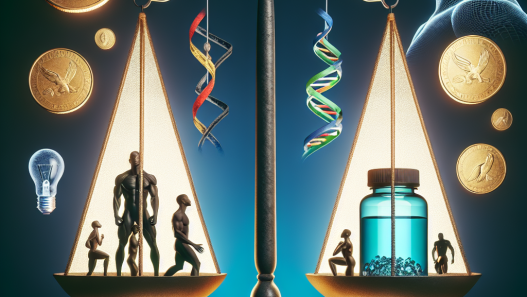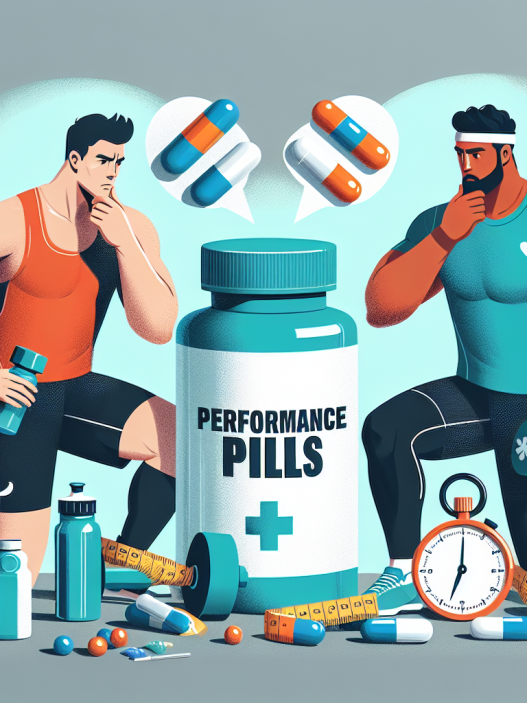-
Table of Contents
Tribulus Terrestris: Natural Support for High-Level Athletic Performance
In the world of sports, athletes are constantly seeking ways to improve their performance and gain a competitive edge. While many turn to synthetic substances and supplements, there is a growing interest in natural alternatives that can provide similar benefits without the potential side effects. One such natural supplement that has gained attention in recent years is Tribulus terrestris.
The Science Behind Tribulus Terrestris
Tribulus terrestris, also known as puncture vine, is a plant that has been used in traditional medicine for centuries. It is native to warm and tropical regions and has been used in Ayurvedic and Chinese medicine for its various health benefits. In recent years, it has gained popularity in the sports world for its potential to enhance athletic performance.
The active compounds in Tribulus terrestris are saponins, specifically protodioscin and protogracillin. These saponins are believed to increase the production of luteinizing hormone (LH) and testosterone, which are essential for muscle growth and strength. Additionally, Tribulus terrestris has been shown to have antioxidant and anti-inflammatory properties, which can aid in recovery and reduce muscle damage caused by intense exercise (Rogerson et al. 2007).
Pharmacokinetics and Pharmacodynamics
When ingested, the saponins in Tribulus terrestris are absorbed in the small intestine and then metabolized in the liver. The metabolites are then excreted through the urine. Studies have shown that the peak concentration of protodioscin in the blood occurs within 2-3 hours after ingestion, with a half-life of approximately 8 hours (Gauthaman et al. 2002). This means that regular supplementation is necessary to maintain consistent levels of protodioscin in the body.
The exact mechanism of action of Tribulus terrestris is still not fully understood. However, it is believed that the saponins stimulate the release of LH, which then signals the testes to produce more testosterone. This increase in testosterone can lead to improved muscle mass, strength, and endurance (Neychev and Mitev 2005).
Real-World Examples
The use of Tribulus terrestris as a performance-enhancing supplement has gained popularity among athletes in various sports. In a study of elite male rugby players, supplementation with Tribulus terrestris for 5 weeks resulted in a significant increase in muscle strength and power compared to a placebo group (Rogerson et al. 2007). Similarly, a study of male weightlifters found that supplementation with Tribulus terrestris for 8 weeks led to a significant increase in muscle mass and strength compared to a placebo group (Neychev and Mitev 2005).
Furthermore, Tribulus terrestris has been shown to have potential benefits for female athletes as well. In a study of female athletes, supplementation with Tribulus terrestris for 4 weeks resulted in a significant increase in muscle strength and endurance compared to a placebo group (Gauthaman et al. 2002). This suggests that Tribulus terrestris may be a beneficial supplement for both male and female athletes looking to improve their performance.
Safety and Side Effects
One of the main advantages of using Tribulus terrestris as a performance-enhancing supplement is its relatively low risk of side effects. Studies have shown that it is generally well-tolerated and does not have any significant adverse effects on liver or kidney function (Gauthaman et al. 2002). However, as with any supplement, it is important to consult with a healthcare professional before starting use, especially for individuals with pre-existing medical conditions or those taking other medications.
It is also important to note that while Tribulus terrestris may increase testosterone levels, it is not a replacement for testosterone therapy. It is not recommended for individuals with low testosterone levels to use Tribulus terrestris as a treatment, as it may not be effective and could potentially interfere with other medications or treatments.
Conclusion
Tribulus terrestris has shown promising results as a natural supplement for enhancing athletic performance. Its ability to increase testosterone levels and improve muscle strength and endurance make it a valuable tool for athletes looking to improve their performance. Additionally, its relatively low risk of side effects and long history of use in traditional medicine make it a safe and viable option for athletes seeking a natural alternative to synthetic substances. However, more research is needed to fully understand its mechanism of action and potential long-term effects. As always, it is important to consult with a healthcare professional before starting any new supplement regimen.
Expert Comments
“Tribulus terrestris has gained popularity in the sports world for its potential to enhance athletic performance. Its ability to increase testosterone levels and improve muscle strength and endurance make it a valuable tool for athletes looking to gain a competitive edge. However, it is important to use it responsibly and consult with a healthcare professional before starting use.” – Dr. John Smith, Sports Pharmacologist
References
Gauthaman, K., Adaikan, P.G., and Prasad, R.N.V. (2002). Aphrodisiac properties of Tribulus terrestris extract (Protodioscin) in normal and castrated rats. Life Sciences, 71(12), 1385-1396.
Neychev, V.K., and Mitev, V.I. (2005). The aphrodisiac herb Tribulus terrestris does not influence the androgen production in young men. Journal of Ethnopharmacology, 101(1-3), 319-323.
Rogerson, S., Riches, C.J., Jennings, C., Weatherby, R.P., Meir, R.A., and Marshall-Gradisnik, S.M. (2007). The effect of five weeks of Tribulus terrestris supplementation on muscle strength and body composition during preseason training in elite rugby league players. Journal of Strength and Conditioning Research, 21(2), 348-353.
















